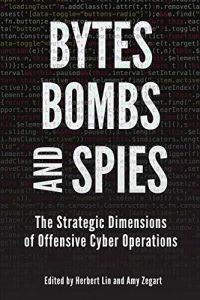Acesse a sua conta getAbstract para obter o resumo!

Acesse a sua conta getAbstract para obter o resumo!
Herbert Lin and Amy Zegart
Bytes, Bombs and Spies
The Strategic Dimensions of Offensive Cyber Operations
Brookings Institution Press, 2019
Sobre o que é?
Cyberspace is a geopolitical hot zone.
Recommendation
Cyberspace is the new front of geopolitical conflict – a place where nations like North Korea can strike blows that far exceed their capacity in traditional warfare. According to the experts in cybersecurity represented in this essay collection, the rise of cyber warfare raises all manner of strategic dilemmas. How does America retaliate against an adversary that has no internet economy? Will retaliatory cyberattacks really deter enemies? This study provides more questions than answers, while also asserting that cyberspace is an increasingly crucial front in the fight for international power.
Summary
About the Authors
Herbert Lin is senior research scholar for cyber policy and security at Stanford University. Amy Zegart is a professor of political science at Stanford. Both are affiliated with the university’s Center for International Security and Cooperation and the Hoover Institution.

















Comment on this summary